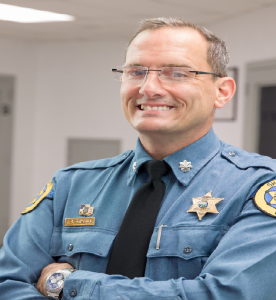People call us the ‘invisibles’ of public safety.
“Working in corrections, we’re very autonomous. We live on an island, so to speak.
“There are five major correctional facilities in Kansas City [Kansas], plus numerous jails, all holding about 8,000 inmates. Hundreds of millions of dollars are being spent, yet no one wants to hear about it, talk about it, or see it. That makes funding a real challenge. It’s not popular for elected officials to say we need more money for the jail – it’s not sexy, it doesn’t play well with the voters. When you say we need more money for corrections, say for an upgrade of the jail, people don’t want to even talk about it.
“Our job is behind the scenes. If you’re not in the news, you did a great job.”
Staffing is our biggest challenge and the most critical element to our success.
“Corrections finds you, you don’t find corrections. No one in their right mind would say ‘I want to work in a correctional facility.’ No one would choose to walk into a community of criminals. Obviously, that makes staffing a real challenge. We’re the bottom of the barrel, the armpit of public safety.
“What happens is that an opportunity comes up somewhere along the line, and you find out that you’re good at it. The industry embraces you, and you go up the ladder pretty quick.
“Staffing, training, supervision, professional development and facilities: all five things have to be firing all at once, because if we fail, it could be catastrophic.”
Corrections found me by way of a 20-year career in the Army.
“I was a first sergeant at Guantanamo Bay, in the detention camps. For the majority of my 20-year Army career, I was in corrections. I served in facilities in Alaska, Korea, Guantanamo Bay and Germany, finally ending at Ft. Leavenworth. The Army does corrections right. They spend a lot of money. Our jail and Fort Leavenworth both house 400 inmates. Leavenworth’s budget is $50 million, ours is $18 million. We have a staff of 150, they have a staff of 1200. They’re big on programming and have a brigade of military police.
“Back in 2001, the Army did a study to see why it was in corrections; they wanted to civilianize it. Then Abu Ghraib hit, and the Army said, ‘That’s why we’re in corrections.’ When we don’t train and supervise, that’s what happens. You put artillery soldiers in charge of a jail, don’t expect jail to be operating in accordance.
“When I retired from the Army in 2008, civilian corrections was a good fit. Just 10 months after I came out, I was promoted to administrator.* The industry is hungry for leadership: people who take care of people. The Army is really talented at training people to take care of people. It has to be. It’s all volunteer. People wouldn’t sign up or stay if they didn’t.
“Same goes for corrections: You have to have people who are going to take care of it and nurture it. It’s a very sensitive ecosphere – the littlest change can throw it in to a tailspin.”
Despite its challenges, corrections is the biggest and best way to impact and change people’s lives.
“We serve the neediest of all people. Inmates need more than anyone. There are usually five things wrong when someone ends up here: homelessness, addiction, medical problems, mental illness, and/or abuse. When you end up in this facility, all other options have failed.
“If you want to affect change, corrections is best place to be a change agent. We affect people’s lives every day in a positive way. We get letters all the time where people tell us that we saved their life, or the life of their loved one. They tell us: ‘Your jail is quiet, clean and safe; it gave me the time to get my life together.’
“A constitutionally sound correctional facility can change lives. It disconnects you from the criminal element and connects you with people who can help you get your life back together.”
The simplest of solutions are sometimes the best.
“All out inmates have tablets with 500 educational programs on them – some faith-based stuff, a few games and music. The battery life is about five hours, so that’s five hours of ‘me’ time.
“It keeps their brains active, engaged and alert. Our mental health coordinator said, ‘You will not see any suicides if you give them tablets.’
“We have a high suicide rate in jails and multiple attempts. You’re in a dark cell. It’s cold. They’ve lost hope … A tablet can be an oasis. It can relieve some of the pain.”
The biggest threat to corrections is addiction.
“Addiction is our number one problem and our biggest threat. Over 95% of our inmates are addicted to something. An inmate coming off the street is hours from death. Could be meth, heroin, cocaine … Detox takes expensive medication, time and staff, and if you screw up, that person is going to die. The side-effect is death.
“First comes jail, then prison. We assess them, detox them and stabilize them. This includes medical issues outside of addiction. If they need surgery, for example, jails pay for that. Then they go to prison. The prison gets a clean inmate.
“We’re also the largest mental health provider in the government, period. Cook County in Chicago has 10,000 inmates and 20% are mentally ill. We have about 400 and about 120 are chronically mentally ill.”
Done well, there’s a place for privatization.
“Private prisons are in it to make money; we’re in it for public safety. Oversight is key in these facilities. As we say in the Army: ‘check the checker.’
“There is a place for privatized facilities. We have to reduce the levels of inmates to maintain public safety, and that’s when we have to farm them out. We can supervise x number, and once x number has been exceeded, we have to farm out to a privately owned facility.
“They take the inmates no one else could take. We can’t send them to a minimum-security facility because they’ll escape. It’s happened. We have to send them a company that can handle them.”
We take care of the people no one else wants to deal with.
“Corrections personnel are the unsung heroes of public safety. When a cop arrests someone, they spend maybe an hour with them. We spend 12-hour shifts with these folks.
“Right now, we have 400 inmates, twenty of whom are charged with murder – some of them killed cops. We’re the guys who are going to give them everything they need, from toilet paper to medical care.
“We’re looking down the working end of a lawsuit every day. We know the ACLU intimately. We have to be careful: observe and protect, execute their constitutional rights. Safety, custody, care, control, security, health and welfare: it’s what we do.”
–Warden Jeff Fewell, Wyandotte County Sheriff’s Office, Kansas City, KS
*Warden Fewell won the American Jail Association’s National Administrator of the Year award in 2014.



Thank you Warden Fewell, for an excellent, informative report.
And I thank all our correctional officers for the fine work you do.